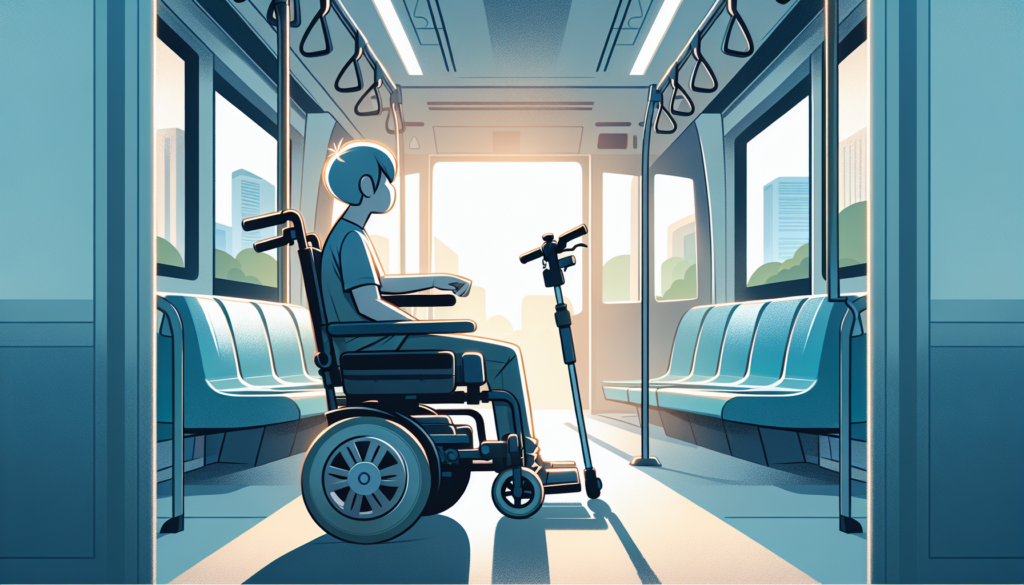
Navigating the world of electric wheelchairs can be both exciting and overwhelming, especially when considering the various options available in the market today. Each model comes with its own set of advantages and disadvantages, making it essential for users to understand their unique features before making a purchase decision. Whether you are looking for portability, battery life, weight capacity, or climbing abilities, the right electric wheelchair can greatly enhance your mobility and overall quality of life.
In this blog, we will delve into the pros and cons of different electric wheelchairs, highlighting popular models from EKO Life MY like the Edegree EW6, Edegree EW1, and Stonbike TU-04, so you can make an informed choice that best suits your needs.
Overview of Electric Wheelchairs
Electric wheelchairs have revolutionized the way individuals with mobility challenges navigate their environments. With various models available in the market, they offer differing ranges, battery types, and features that cater to different user needs. For instance, the Edegree EW6 and EW1 provide options with lithium and lead-acid batteries, respectively, showcasing unique specifications that impact their performance and usability. The EW6 offers a range of 10-15km on a single charge, while the EW1 boasts a longer range of 20km. Both models are designed with user comfort in mind, providing flexible speed settings and weight capacities suitable for a wide range of individuals.
The inclusion of a dual motor in models like the EW1 enhances the overall driving experience, especially on inclines. However, it is vital to consider the trade-offs involved. For example, while the Edegree EW6 offers a lighter weigh-in at 14.8kg, it has a shorter range compared to other options like the Stonbike TU-04, which offers 25km per charge but carries a heavier weight of 28kg. Additionally, the Stonbike provides a superior climbing ability of 25° compared to the others, emphasizing the importance of aligning the specifications with user requirements. Understanding these nuances helps consumers make informed choices about electric wheelchairs, leading to optimal user satisfaction and mobility enhancement.
Edegree EW6: Features and Benefits
The Edegree EW6 electric wheelchair is a compact and efficient option designed for users seeking versatility and reliability in their mobility solutions. With a range of 10-15 kilometers per charge, this wheelchair is powered by a 24V lithium battery, which not only contributes to its lighter weight of 14.8 kilograms but also ensures a quick and responsive performance. The dual motor system, featuring a 24V 190W brushless motor, allows users to navigate with ease at a forward speed of up to 8 km/h. Additionally, the Edegree EW6 boasts a 5-speed gear system, providing users with control and adaptability for different terrains, making it an ideal choice for both indoor and outdoor use.
Its climbing capability of less than 10 degrees further enhances its usability, allowing users to tackle slight inclines with confidence. The maximum load capacity of 100 kilograms ensures it can support a wide range of users comfortably. One of the standout benefits of the Edegree EW6 is its balance of power and manageability, combined with a robust feature set tailored to enhance the user’s experience.
Although its 10-15 kilometer range might be limiting compared to some other models, it is still practical for daily errands and short trips, especially given the quick charging time of 6-8 hours. At a competitive price of RM 4,388, the Edegree EW6 represents a valuable investment for those seeking an electric wheelchair that offers both performance and convenience, helping users maintain their independence while navigating their surroundings more freely.
Edegree EW6: Drawbacks and Limitations
While the Edegree EW6 offers some impressive features, it also comes with a few drawbacks and limitations that potential users should consider. One primary limitation is its range per charge, which is only between 10 to 15 kilometers. For individuals who plan to use their electric wheelchair for longer distances, this might prove insufficient. Additionally, the maximum forward speed of 8 km/h may be satisfactory for some users, but for those seeking a faster mode of transportation, it could be a drawback. The battery charging time of 6 to 8 hours might also be a concern for users who need quicker turnaround times between uses.
Another significant limitation of the Edegree EW6 is its weight of 14.8 kg, which may pose a challenge for some users when lifting or transporting the chair. Moreover, while it offers a decent climbing ability of less than 10 degrees, it may not be suitable for steep inclines or uneven terrains. Coupled with its dual motor 24v190w system, which falls short compared to other models like the Edegree EW1 and Stonbike TU-04, users might feel the need to explore options that better match their mobility requirements and lifestyle needs.
Edegree EW1: Features and Benefits
The Edegree EW1 electric wheelchair stands out for its impressive range per charge, allowing users to travel up to 20 kilometers on a single battery cycle. This model is equipped with a sturdy lead-acid battery, providing reliability and a decent charging time of only six hours. Weighing in at 38 kg, the EW1 can support a maximum load of 100 kg, making it a viable option for a variety of users. Its dual motor system, comprising of 24v250w, grants a climbing ability of 13 degrees, making it suitable for traversing gentle slopes. However, with a forward and reverse speed of only 0-6 km/h, it might not be the best option for those requiring faster mobility.
Additionally, the EW1 features a five-speed gear option, allowing users to adjust their speed according to their comfort and environment. While the weight of the wheelchair may be an inconvenience for some, it adds to the overall durability and stability of the device. In terms of price, the Edegree EW1 is attractively priced at RM 2,499, making it an accessible electric wheelchair for budget-conscious individuals, despite its limitations in speed. Overall, the Edegree EW1 offers a balanced combination of features and benefits for those seeking reliable mobility solutions.
Edegree EW1: Drawbacks and Limitations

The Edegree EW1 offers several valuable features, but it also has its drawbacks and limitations that potential users should consider. With a range per charge of 20km, it may seem adequate for short trips. However, this could be insufficient for longer outings, particularly for those who require a stable and reliable mode of transportation. Additionally, the model is heavier than some alternatives at 38kg, which can make maneuvering and transportation more challenging for individuals with limited upper body strength. The maximum speed of 6km/h, while safe, may feel slow for users accustomed to faster mobility options, limiting its appeal during transportation across busy environments.
Moreover, the Edegree EW1 uses a lead-acid battery, which typically has a shorter lifespan compared to lithium batteries found in other models. This translates to potentially more frequent replacements and ongoing maintenance, impacting the long-term cost-effectiveness of the chair. The climbing ability of 13 degrees is relatively decent but could limit certain users when navigating steeper inclines. While the 5-speed gear offers some customization, it might not cater effectively to users with specific mobility needs or preferences. In summary, while the Edegree EW1 is a compelling electric wheelchair, weighing its drawbacks alongside its benefits is crucial for potential purchasers.
Stonbike TU-04: Features and Benefits
The Stonbike TU-04 stands out in the market of electric wheelchairs, offering a versatile blend of features suited for various users’ needs. With a range of 25 km per charge, it allows for greater mobility without the constant concern of battery life. Its dual motor with a power output of 24V 250W gives the user the ability to tackle inclines with a climbing ability of 25°, making it suitable for those who live in hilly areas.
Additionally, the lithium battery provides a quicker charging time of just 3-5 hours, which is a significant advantage over other models. Weighing in at 28 kg, it’s relatively lightweight, allowing for easier transport and storage, while still supporting a maximum load of 150 kg, thus accommodating a wider range of users.
Despite these advantages, potential buyers must also consider some downsides. The relatively lower maximum speed of 6 km/h for both forward and reverse may not meet the needs of users seeking faster transportation. Moreover, although it carries a robust build, its weight may still present challenges for those who need to lift or maneuver it frequently. Additionally, with a price tag of RM 3,600, it may not be the most budget-friendly option for everyone seeking an electric wheelchair. Understanding the Stonbike TU-04’s features and benefits alongside its limitations can greatly assist users in making informed decisions for their mobility needs.
Stonbike TU-04: Drawbacks and Limitations
The Stonbike TU-04 electric wheelchair presents a range of features that cater to various user needs; however, it also comes with its drawbacks and limitations. One significant downside is its weight, which stands at 28kg. Although it is designed for users with a max load capacity of 150kg, this weight may pose challenges for transportation and maneuverability, particularly for caregivers or users who need to lift it into vehicles. Additionally, its climbing ability is rated at 25°, which, while higher than many competitors, may still be inadequate for users living in hilly areas or those requiring more versatility in navigating uneven terrain.
The forward and reverse speeds cap at only 6km/h, which may feel limiting for individuals wanting faster mobility. Moreover, the Stonbike TU-04’s battery charging time ranges from 3-5 hours, making it a relatively efficient option. However, the lead-acid battery type used may not be as reliable as lithium batteries, potentially impacting long-term performance and requiring more frequent replacements. Ultimately, while the Stonbike TU-04 presents an appealing blend of stability and weight capacity, these drawbacks warrant careful consideration in the decision-making process for potential buyers seeking an electric wheelchair that matches their specific lifestyle and mobility needs.
Comparative Analysis: Choosing the Right Electric Wheelchair
When selecting an electric wheelchair, it’s essential to evaluate the specifications and features that best meet individual needs. For instance, the Edegree EW6 offers a range of 10-15km per charge with a dual motor and a climbing ability of less than 10°, which can be suitable for navigating flat terrains. However, it has a shorter range compared to the Edegree EW1, which covers 20km per charge and has a robust climbing ability of 13°, making it slightly better for diverse terrains.
With a charging time of 6 to 8 hours, the EW6 takes a bit longer to recharge compared to the Stonbike TU-04, which boasts the shortest charging time of 3-5 hours while delivering a notable range of 25km, perfect for longer outings. Each model has unique weight capacities, speeds, and battery types, influencing user experience significantly.
On the other hand, user’s comfort and ease of use should be prioritized as well. The Edegree EW1, although the heaviest at 38kg, features a dual motor that provides adequate traction, whereas the Stonbike TU-04 is lighter with a max load of 150kg, allowing for more flexibility when carrying additional weight. The forward speed of the Edegree EW6 is faster compared to the EW1, which may be appealing for those seeking a quick outing. Knowing these nuances can greatly assist in making a well-informed decision regarding the most suitable electric wheelchair tailored to user lifestyle and environment.
Final Thoughts on Choosing the Right Electric Wheelchair

In conclusion, selecting an electric wheelchair is a significant decision that depends on various factors including range, weight, battery type, and the specific needs of the user. The Edegree EW6 offers great versatility in terms of speed and ease of mobility, while the Edegree EW1 presents a more economical choice despite its heavier build. For those who prioritize distance and climbing ability, the Stonbike TU-04 could be an optimal option, providing superior performance with its lithium battery and impressive climbing grade. Each model has its own set of features that will appeal to different users, making it essential to assess personal needs and preferences carefully.
Ultimately, understanding the distinctions among these electric wheelchairs will empower you to make an informed decision that best supports your mobility and lifestyle. Consider testing them out, if possible, to find the perfect match for your requirements. Remember to weigh the pros and cons of each option and factor in the total cost of ownership, which includes long-term maintenance and battery replacement. Adequate research and consideration will go a long way in ensuring you find the ideal electric wheelchair that will enhance your daily experience and independence.

I’m not sure what the blog post is about, can you provide more context?
Hello Faizal bin Hamid, thank you for reaching out to us about the unclear blog post. I’d be happy to provide more context if you can tell me more about what type of content you were expecting from our blog. In the meantime, I’d like to direct you to our latest blog at Eko Life Malaysia where we share tips and guides related to bicycles, ebikes, and e-scooters. If you could provide me with a bit more information about your query, I’ll be more than happy to help and provide a more detailed explanation. Don’t hesitate to reach out to us via E-MAIL: [email protected], or PHONE: +60 3-7890 3042.
I’m really excited to read this post! Hopefully it’s about inspiring stories.
Hi Khadijah, I’m glad you’re excited! Unfortunately, it seems that you’ve commented on an empty post. However, I’d be happy to assist you. If you’re looking for inspiring stories, I’d suggest visiting our Eko Life Malaysia page where we feature real-life stories of bike enthusiasts. Alternatively, if you have any questions or concerns, please don’t hesitate to reach out to us at [email protected] or +60 3-7890 3042. We’re here to help!
A bit confusing, I’d like to see a clear summary up front.
Hi Taufiq bin Ali, thank you for your feedback! We appreciate your suggestion to provide a clear summary upfront. At Eko Life Malaysia, we’re constantly striving to improve our content and make it easier for our readers to understand. We’ll take your feedback into consideration for future blog posts. Would you like to contact us directly to discuss further? You can reach us at [email protected] or +60 3-7890 3042.